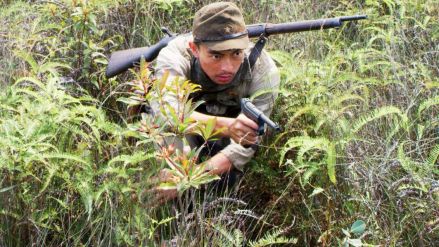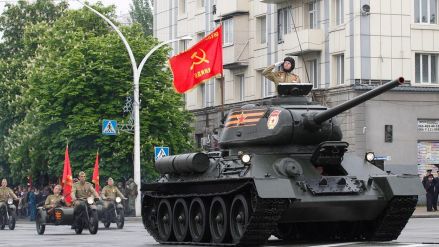The regime’s people don’t like him, yet Putin treats him like a son
30.03.2022
In Chechnya, there are no pro-Russian politicians. Those associated with Ramzan Kadyrov are often called that, but in truth, they are first and foremost pro-Chechnyan politicians. They work for the wellbeing of Chechnya, for what they understand by it, and in addition, they fulfill their own interests- says Wojciech Górecki, an expert on the Caucasus and Central Asia.
TVP WEEKLY: The soldiers of Ramzan Kadyrov were to sow fear and terror in Ukraine. Yet some say that their ranks were dismantled and those who survived went back to Chechnya. Maybe the Kadyrovtsy are not true to their image of top soldiers?
WOJCIECH GÓRECKI: There is a lot of information noise out there so we have to be careful with our judgments. We don’t know how many Kadyrovtsy were sent to Ukraine, how many stayed or were withdrawn. The commander of the Siewier (north) Regiment of the Chechen unit gen. Magomed Tushayev was to be killed in combat- and this we rather can confirm. However, it is difficult to say anything about the overall balance of Chechens’ presence in Ukraine. For sure the Kadyrovtsy, contrary to the expectations, did not scare Ukrainians. Taking into consideration PR and the optics, their role in the invasion backfired.
The Kadyrovtsy were placed in two areas: in the north – in the vicinity of Kyiv, i.e. in Hostomel (this is where gen. Tulshayev was killed), as well as in the south-east, in Mariupol – this is where they’re still, probably, fighting. There was also an interesting exchange of “pleasantries” between a close associate of Ramzan Kadyrov, a member of the Russian State Duma, Adam Delimkhanov, and one of the commanders of separatists forces from the Donetsk People’s Republic (DPR).
You mean?
The commander from DPR said that Chechens are underperforming on the battlefield. After speaking with Delimkhanov he revoked his statement saying that it was only his first impression and that, overall, the Chechen soldiers are fine. We do not know whether it is Kadyrov’s man who “persuaded” him to change his mind; or if the Chechens began to be truly more effective in combat. Delimkhanov was said to appear in the vicinity of Mariupol, and even in the city itself. Perhaps, he managed to motivate the soldiers.
How important was gen. Magomed Tushayev in Ramzan Kadyrov’s crowd
He did not belong to Kadyrov’s inner circle, yet he was an important character. He was known for persecuting the LGBT community. He was a skilled commander. Kadyrov doesn’t have many men like him, so the loss of gen. Tushayev is significant.
What kind of forces – not only in Ukraine but in general – does the Chechen leader have?
The exact number of soldiers is unknown, however, it is estimated that there are a few, or maybe over a dozen thousand men. Formally they are a part of the Russian National Guard, yet in practice, they’re more loyal to Kadyrov than to the Russian state (hence the name Kadyrovtsy).
Are there any metrics that could tell us how the participation in the war of the Kadyrovtsy forces is viewed in Chechnya? And what is the approach to Kadyrov himself?
Of course in this case we cannot speak of any public opinion polls. However, roughly ten years ago, when the memory of the Chechen wars was still fresh, according to the estimates of prof. Aleksiej Małaszenko, a renowned expert on the Caucasus and Islam – Ramzan Kadyrov was supported by at least 50 percent of society.
It seems like a very high support. What does it stem from?
For ordinary Chechnyans, the most important things were stability and peace. Bombs stopped falling on their heads and Grozny was being rebuilt. Money was flowing in from Moscow (of course to a large extent embezzled), and one could live fairly normally. All of these pros– at least for this half of the Chechen population- outweighed the cons of Kadyrov’s rule.










